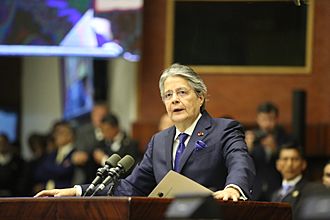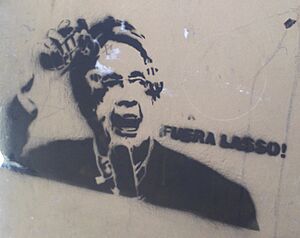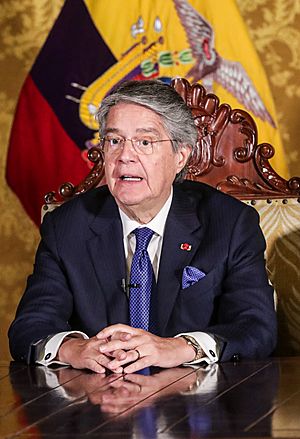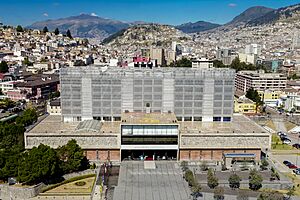2023 Ecuadorian political crisis facts for kids
Quick facts for kids 
Lasso appearing before the National Assembly during his impeachment inquiry on 16 May 2023, the day before he invoked muerte cruzada
|
|
| Date | 17 May 2023 – present |
|---|---|
| Location | Ecuador |
| Type | Parliamentary crisis |
| Cause | President Guillermo Lasso invoked muerte cruzada ('mutual death') |
| Outcome | Dissolution of the National Assembly 2023 general election triggered |
A big political problem started in Ecuador on May 17, 2023. This happened because President Guillermo Lasso was facing a special trial to remove him from office. This trial began in the National Assembly, which is like Ecuador's parliament, on May 9. It ended on May 17 when President Lasso used a special rule called muerte cruzada (which means "mutual death"). This rule allowed him to close down the National Assembly. It also meant that new elections for president and parliament would happen sooner than planned. This was the first time an Ecuadorian president had ever used this special rule.
Contents
Why the Crisis Started
Past Problems for President Lasso
President Guillermo Lasso faced several challenges during his two years in office. Some people accused him of being involved in financial issues.
In October 2021, a large leak of financial documents called the Pandora Papers caused a stir. These papers showed that Lasso had bank accounts in other countries. These accounts were in places known as "tax havens." A tax haven is a country or place where people or companies can keep money with very low taxes. It can also make it harder for others to see how much money someone has. In Ecuador, it is against the rules for public officials to have secret foreign accounts.
Lasso said he would be open about his finances. He stated that he had moved his money from these foreign accounts legally. A group in the parliament tried to start a process to remove him from his job. However, his government stopped this attempt.
The Political Crisis Unfolds
On May 17, 2023, President Lasso used the muerte cruzada rule. He said that the lawmakers trying to remove him were trying to "destabilize the government." This special rule lets the president close the National Assembly. It also calls for early elections for both the president and the parliament.
While waiting for the new elections, President Lasso would govern Ecuador by issuing special orders. On the same day, Lasso ordered the military to guard the Legislative Palace in Quito. This stopped staff and assembly members from entering the building. The assembly members had planned to continue their meeting about removing the president. This was the first time an Ecuadorian president used this rule to avoid being removed from office.
On the day he closed the parliament, Lasso also issued a special order. This order gave tax cuts to the middle class in the country. Many people criticized this decision. Some even tried to stop it within hours. Lasso said using the muerte cruzada rule was the best solution. He wanted to give the people of Ecuador "the power to decide" the country's future in the upcoming election.
The Confederation of Indigenous Nationalities of Ecuador, a large indigenous group, spoke out against Lasso's actions. They warned they might protest. However, the Ministry of National Defence said they would stop any violent protests. Many people noted that the military and police supported Lasso's decision. They said it was allowed by the constitution.
After muerte cruzada was used, some former members of the National Assembly asked the Constitutional Court to review Lasso's decision. They argued that the president's choice had no legal reason.
On May 18, several former assembly members spoke out. They said Lasso's order was not allowed by the constitution. They argued that the country was not facing a serious crisis when he used the rule. The former Assembly President, Virgilio Saquicela, also filed a lawsuit. He said Lasso's order was against the constitution. That same day, a government minister, Henry Cucalón, defended Lasso's actions. He said the president had the right to use the rule. On the night of May 18, the Constitutional Court voted. They all agreed to reject the request to say Lasso's order was unconstitutional.
The National Electoral Council (CNE) then met to get ready for the new general election. The president of the CNE, Diana Atamaint, announced the election dates. The first round of voting would be on August 20. If no one won enough votes, a second round would be on October 15. The new president would likely take office in November 2023. After Lasso's order, former Vice President Otto Sonnenholzner and former Assemblyman Fernando Villavicencio announced they would run for president. President Lasso himself said he did not plan to run for re-election.
What People Said
In Ecuador
- Former president Rafael Correa said Lasso's order was "illegal." He stated that there was "obviously no internal upheaval," which was Lasso's reason for using the rule. Correa also said it was a good chance to remove Lasso and his government from power.
- Former president Lenín Moreno asked for calm in the country. He wanted to avoid problems like those in the February 2023 local elections. He called for "unity" and "humility" in Ecuador's uncertain political situation.
- Former mayor of Guayaquil Jaime Nebot said Lasso's action was "unconstitutional." He called it "problematic and a dictatorship in disguise."
Around the World
 Bolivia: Former president Evo Morales criticized Lasso. He questioned why Lasso could stay in office to avoid problems, but former Peruvian president Pedro Castillo was removed for "doing the same."
Bolivia: Former president Evo Morales criticized Lasso. He questioned why Lasso could stay in office to avoid problems, but former Peruvian president Pedro Castillo was removed for "doing the same." Chile: The government hoped the crisis would be solved using Ecuador's "democratic and institutional mechanisms." They stressed the importance of following the law.
Chile: The government hoped the crisis would be solved using Ecuador's "democratic and institutional mechanisms." They stressed the importance of following the law. Mexico: President Andrés Manuel López Obrador doubted that Lasso's order would cause instability. He hoped the upcoming election would solve the crisis.
Mexico: President Andrés Manuel López Obrador doubted that Lasso's order would cause instability. He hoped the upcoming election would solve the crisis. Peru: The Peruvian Ministry of Foreign Affairs supported Lasso. They said President Dina Boluarte supported Ecuador's "democratic process."
Peru: The Peruvian Ministry of Foreign Affairs supported Lasso. They said President Dina Boluarte supported Ecuador's "democratic process." United States: The United States Department of State said the country "supports the democratic institutions in Ecuador."
United States: The United States Department of State said the country "supports the democratic institutions in Ecuador."
See also
 In Spanish: Crisis política en Ecuador de 2023 para niños
In Spanish: Crisis política en Ecuador de 2023 para niños
- 2022 Ecuadorian protests




